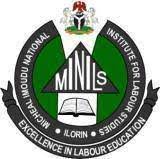
The Director-General of Michael Imoudu National Institute for Labour Studies (MINILS) Ilorin, commended President Muhammadu Buhari for being a signatory to the new global push for countries to increase their education budget by a 100% by 2025.
Aremu said in a statement on Sunday that President Buhari had joined other African leaders at the recently ended Global Education Summit in London, United Kingdom, to deliberate on how to improve the education system through a gradual rise in yearly domestic education expenditure.
Comrade Aremu made the remarks during a courtesy call on members of the Institute’s Governing Council on behalf of the leadership of the Nigeria Labour Congress (NLC) as part of the Institute’s efforts to reposition itself for enhanced labor education for Nigerian workers.
The TUC leadership, led by President Quadri Olaleye, hosted the 8-member Governing Council, led by its chairman, veteran labour leader Chief Comrade Frank Kokori.
The Director-General stated that education, as a critical component of poverty eradication and the development of an inclusive, sustainable economy, deserved adequate, long-term government funding. He believes that education funding should include research and education institutes formed to help the country’s workers develop the skills they need in areas like workplace dispute resolution and productivity improvement.
Comrade Aremu stated that the Institute was on track to achieve its goal of becoming the leading training institution for labor and industrial relations issues in West Africa, as well as a regional centre of excellence in labor studies, but that the Institute’s funding needed to be improved in order to provide effective educational services.
He blamed recurring labour disputes in all sectors of the economy on what he called the “knowledge gap” on critical labour market issues among employers and employees. He said labour education must be seen “as a strategic success factor for motivation, improved productivity and national development”.
In a welcoming address, NLC President Ayuba Wabba said there was an urgent need to resurrect the labor Institute, citing increasing patterns in worldwide labor battles. He praised the Institute’s new management for its new open-door policy for collaboration, which he said will help labor leaders build capability.
He proposed expanding social-economic research and documentation, assessing modern challenges to unionism, and bridging the skill gaps for young employment as prospective areas of collaboration with the Institute.
MINILS was established in 1983 by late President Shehu Shagari to contribute meaningfully to national development by providing regular capacity building training on critical labor market issues to the country’s workforce, organized trade unions, organized employers of labor, and government officials.
Through educated education about complicated labor market issues, the goal is to foster labor-management relations, best practices, and industrial harmony for long-term economic success. (MINILS) has trained a number of workers and employers from both the public and private sectors since its inception.
Over the years, the training with certification has aided in creating a favorable and harmonious environment for the successful implementation of governments’ developmental objectives.
Meanwhile, in a related development both the managements of Micheal Imoudu National Institute for labour studies, (MINILS) Ilorin and National Institute for Security Studies ( NISS) Bwari Abuja had reached an understanding to deepen partnership in areas of curriculum development, exchange of policy ideas and resource fellows to enhance the service delivery of the two agencies.
Speaking at the opening of the 78th meeting of the Governing Council of MINILS in Bwari Abuja last Wednesday, both the commandant of the NISS, Mr Saheed Adeleke and Comrade Issa Aremu the Director-General of MINILS agreed to periodic peer review of activities to share experiences in the institution building.
Source: The Vanguard